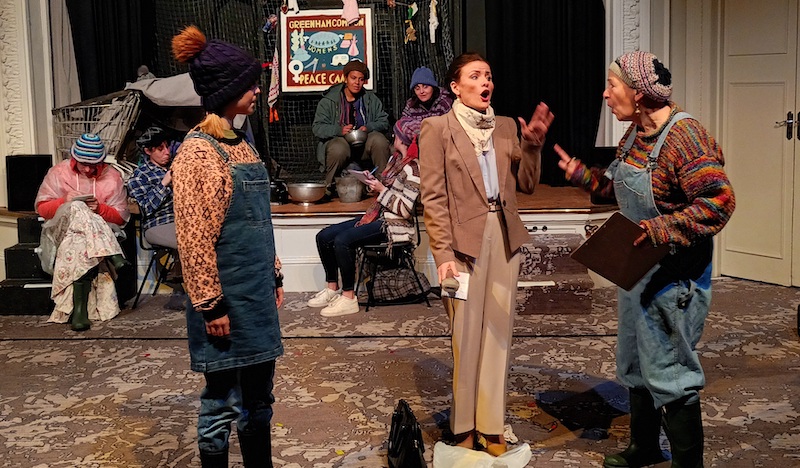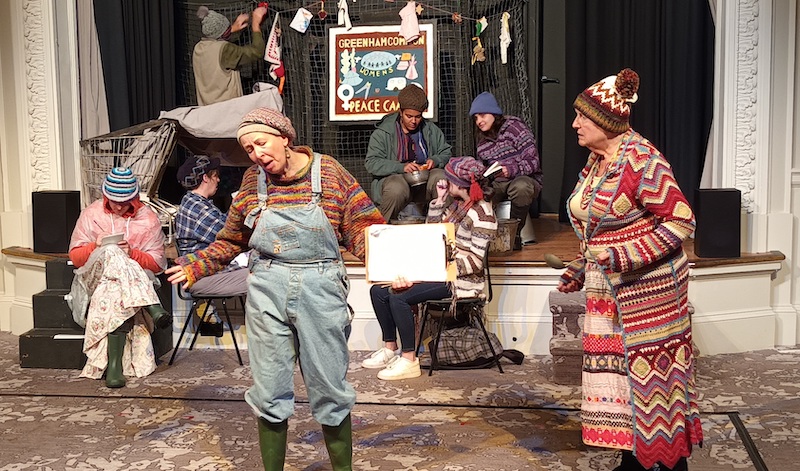Bloody Wimmin
★★★★☆ Connecting
Royal Scots Club (Venue 241): Mon 8 – Sat 13 August 2022
Review by Thom Dibdin
Strong individual performances ensure that EGTG’s production of Lucy Kirkwood’s Bloody Wimmin, at the Royal Scots Club for one week only, gives real life to the connection between two protest movements, twenty years apart.
However, anyone looking for a strongly affirmative account of either Greenham Common or the climate protests of the early Noughties should look elsewhere than Kirkwood’s script. Neither movement is particularly well drawn – it is Greenham’s legacy that interests her.
Director Hilary Spiers has a bit more time for Greenham than the script she is directing. The peace camp was a touchtone event of the early Eighties, when the CND protest against US Cruise missiles being sited at RAF Greenham became a female only affair.
Still, the opening scenes in Greenham Common peace camp are broadly brushed, from the moment Gemma Park’s Reporter tries to do a piece to camera against the backdrop of gumboot wearing women – sporting, it must be said, a most excellent array of authentic early Eighties knitting – there is surely a Kaffe Fasset in amongst the M&S knits.
In amongst the singing and sloganeering, the sniping at the visiting media and bickering over who does the cooking, Jacqueline Wheble’s exasperated, clip-board wielding Margaret is the only point of sanity.
Flora Henderson is naturally bolshi as young protestor Hannah, forcing a showdown with the Reporter and Wendy Mathison is rather magnificent (and believable) as the older woman, Lorraine, bringing tales of internecine conflict and woe from the kitchen, soup ladle still in hand.
launching pad
It’s great fun and provides a neat cartoon shorthand for the camp, but the whole sells its memory short. The point, however, is that this is a launching pad for Torya Winters, as heavily Pregnant Helen for whom pigs blood being thrown over her tent by local youths is he last straw and leaves the camp, returning home to husband, Bob.
Winters and Timothy Bond as Bob provide one of the two stand-out scenes of the short play. Their inability to find a rapprochement, which quickly builds to a confrontation and the dredging up of supposedly forgiven events of their past, is skilfully done. It is tense and thoroughly engaging.
So much for the Eighties. Suddenly it is the Noughties and the climate change protests are everything that Greenham wasn’t. Organised, constructively engaging and democratic affairs. Again, top marks for details from the company: No more knitwear – this time the cast have pulled out their collection of old pre-smartphone, clamshell mobiles.
As the protestors sing their 21st century songs and vote for Eve Dagba’s Sophie to be their media spokesperson, the only disruption to this clean, wholesomely utopian protest is James, calling out the sexism of the decision.
As it turns out that James has grown up with his mother’s ideals and father’s blunt pigheadedness. Bond returns as James, Bob and Helen’s son (of course) with great lunk-headedness. Only this time, his character finds reconciliation – thanks to Sophie’s clarity of vision, and the whole peace comes full circle as Wendy Mathieson returns as Sophie’ aunt, to Lillian to tell her of the role that Greenham played in her own emancipation.
Which really, is Kirkwood’s point. Greenham made many, many people change. Suddenly, women who had never thought to be political had a focus for their energies. They might have secretly voted for Thatcher as Britain’s first female prime minister, but now that her failings were obvious, they could vote with their feet and join the women only protest at Greenham.
It changed individual men too, illustrating what should have been obvious about organising and radical movements on the left. Of course the Patriarchy and the nuclear state remained, but Greenham was a place that either by being there, or having your friends be there, you learned that you did not have to believe in either.
It is this which is the heart of Kirkwood’s script and which Mathieson’s well modulated final monologue fully illustrates.
Running time: 50 minutes (no interval)
The Royal Scots Club (Hepburn Suite), 29-31 Abercromby Place, EH3 6QE (Venue 241)
Mon 8 – Sat 13 August 2022
Evenings: 20:30
Tickets and details: Book here.
ENDS



















